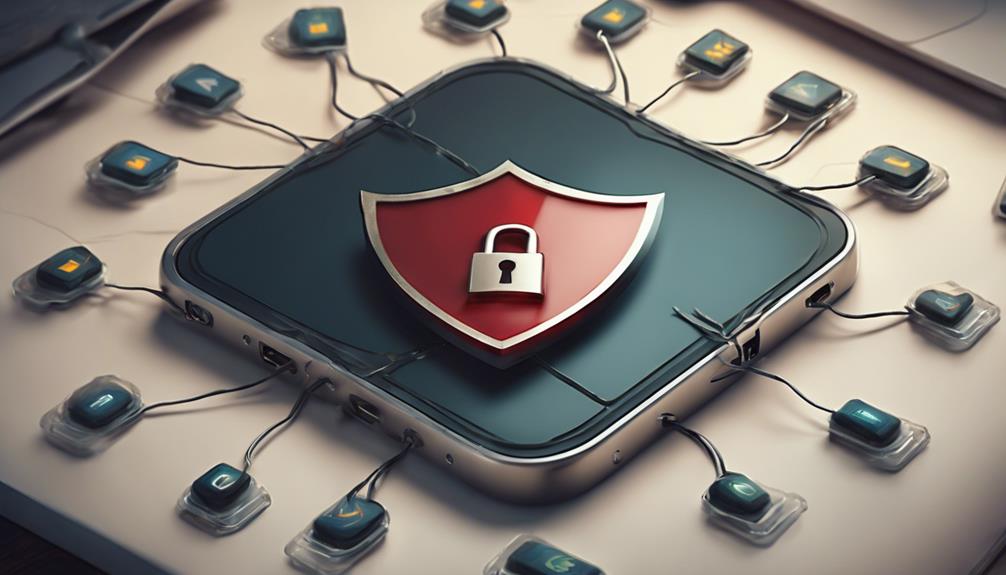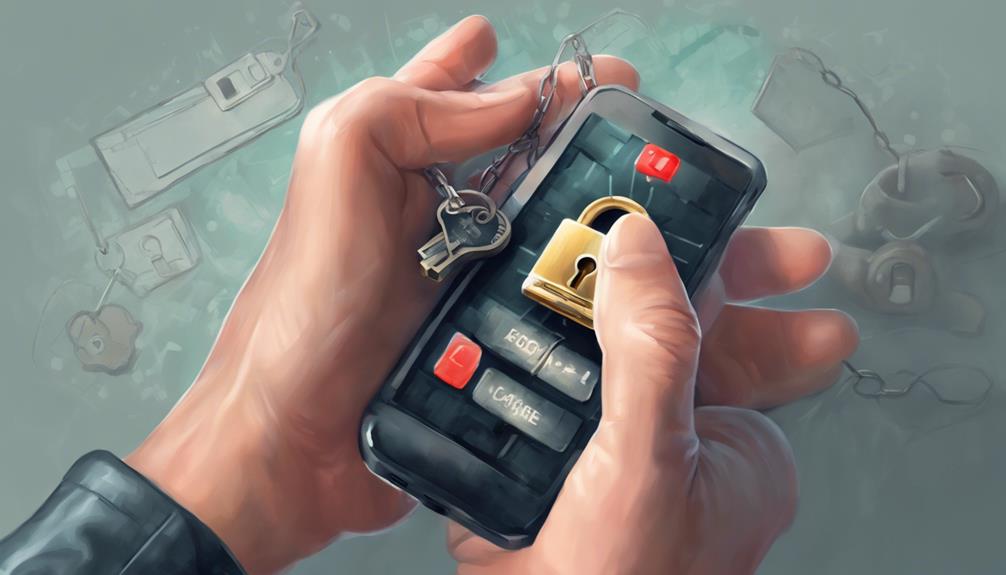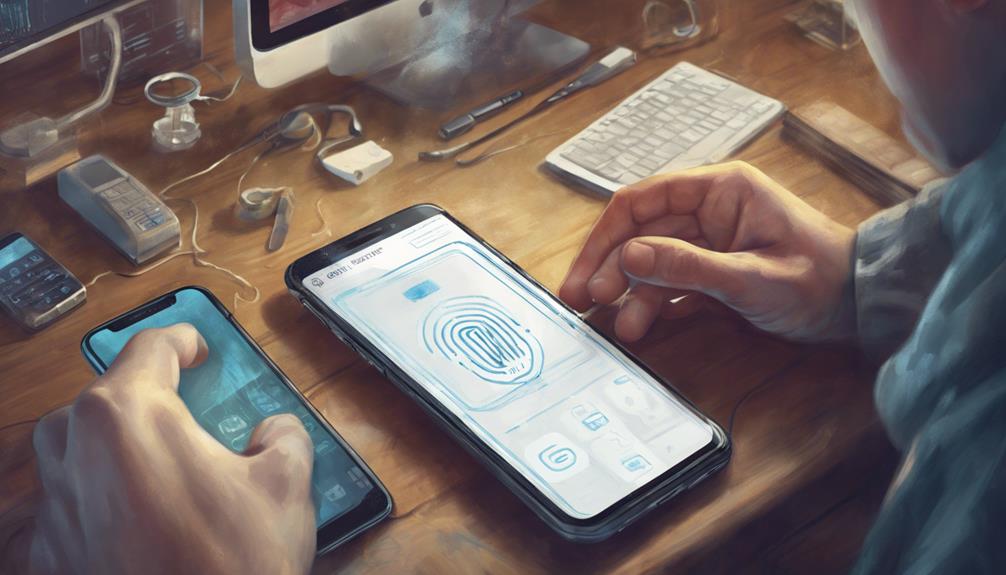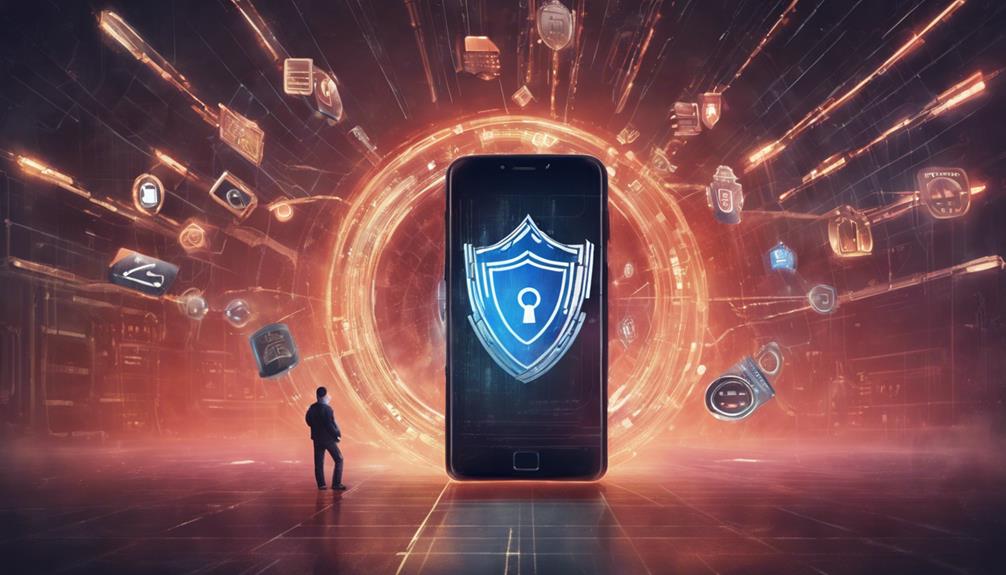To safeguard your phone from hackers, implement stringent security measures. Set up robust passcodes with at least 6 digits and utilize biometric authentication. Regularly change passcodes and avoid suspicious app downloads. Stick to official app stores and update your operating system frequently. Enhance security with trusted VPN services and enable remote data wipe in case of theft. Back up your data consistently and deploy two-factor authentication. Educate yourself on phishing scams and monitor app permissions closely. By following these steps diligently, you can fortify your phone against potential cyber threats.
Key Takeaways
- Use strong passcodes and biometric authentication.
- Update operating system and apps regularly.
- Avoid suspicious app downloads and stick to official stores.
- Enable remote data wipe and two-factor authentication.
- Utilize VPN on public Wi-Fi and educate on phishing scams.
Secure Your Phone With Strong Passcodes
Utilize robust passcodes to fortify the security of your mobile device against potential breaches by unauthorized users. When setting up a passcode for your phone, opt for a complex combination of at least 6 digits to enhance its security features.
Avoid using common and easily guessable passcodes like '1234' or '0000', as these can leave your device vulnerable to hacking attempts. In addition, consider implementing biometric authentication methods such as fingerprint or facial recognition to add an extra layer of protection to your phone.
To further safeguard your device, make it a habit to change your passcode regularly. This practice can help prevent unauthorized access and reduce the risk of security breaches.
Moreover, enable the auto-lock feature on your phone, ensuring that it locks automatically when not in use. These measures will help enhance the overall security of your mobile device and protect your sensitive information from potential threats.
Avoid Suspicious App Downloads

Enhancing phone security involves being vigilant when it comes to downloading apps, particularly focusing on avoiding suspicious sources. Malicious apps pose a significant security issue, often containing malware or spyware that can compromise your device's safety. To help users navigate this potential threat, here are some key points to keep in mind:
| Tips for Avoiding Suspicious App Downloads |
|---|
| Verify app credibility before downloading |
| Check app reviews, ratings, and permissions |
| Stick to official app stores like Google Play Store or Apple App Store |
| Avoid downloading apps from third-party sources |
| Be cautious of apps requesting excessive permissions |
Update Operating System Regularly

Regularly updating your phone's operating system is essential for maintaining the security and performance of your device. By making sure that you have the latest security patches installed, you can protect your data from potential breaches and unauthorized access.
Operating system updates also include bug fixes and enhancements that not only improve the overall performance of your device but also enhance its security features. Setting your phone to update automatically is a convenient way to stay up to date and guarantee that you do not miss important security updates.
Updating your operating system proactively prevents hackers from exploiting known security weaknesses, making it an essential step in safeguarding your device. Keeping your operating system up to date is critical for maintaining the security and integrity of your device's software, helping to prevent potential security threats and vulnerabilities.
Use Trusted VPN Services

Updating your phone's operating system regularly helps bolster its security; another effective measure is utilizing trusted VPN services.
A virtual private network (VPN) encrypts your internet connection, shielding your data from potential hackers. By hiding your IP address, VPNs make it challenging for cybercriminals to monitor your online activities, enhancing your overall security and privacy.
Particularly beneficial on public Wi-Fi networks, where data interception risks are higher, reliable VPN services create secure connections, safeguarding your sensitive information from unauthorized access.
Moreover, VPNs enable you to access geo-blocked content while maintaining your online privacy. When selecting a VPN provider, it is essential to look for those with a strict no-logs policy, ensuring that your browsing history and online actions remain confidential and protected.
Enable Remote Data Wipe Feature

To guarantee the safety of your phone from potential threats, activating the remote data wipe feature is essential. This function allows you to erase all personal information if your device is lost or stolen, safeguarding your sensitive data from unauthorized access.
Data Wipe Benefits
Activating the remote data wipe feature on your phone is a crucial step in safeguarding your sensitive information from potential security breaches. By enabling this feature, you can guarantee that your personal data is protected and inaccessible to unauthorized individuals.
The benefits of utilizing remote data wipe include:
- Protection of Sensitive Information: Remote data wipe allows you to erase all data on your device in case of loss or theft, safeguarding your sensitive information from falling into the wrong hands.
- Prevention of Unauthorized Access: This feature helps in preventing unauthorized access to your personal data, ensuring that your privacy is maintained and reducing the risk of identity theft.
- Enhanced Security Measures: By activating remote data wipe, you can remotely erase all content on your phone, providing an additional layer of security to prevent misuse of your information and ensuring that your personal and confidential data remains secure.
Setting up Remotely
Activating the remote data wipe feature on your phone guarantees proactive protection of your sensitive information in the event of theft or loss. This vital step in enhancing phone security allows you to remotely erase all data on your device, ensuring that your personal data remains safeguarded.
By setting up remote data wipe, you create a barrier that prevents hackers from accessing your confidential information even if your phone is compromised. This feature not only provides peace of mind but also acts as a preventive measure against potential data breaches.
Taking the initiative to enable remote data wipe is an essential way to protect personal data and mitigate the risks associated with unauthorized access to your device. By incorporating this security measure into your phone, you are reinforcing your commitment to safeguarding your information and maintaining control over your digital privacy.
Stay one step ahead by implementing remote data wipe and fortify your defense against potential security threats.
Be Cautious of Public Wi-Fi Networks

Public Wi-Fi networks pose a significant risk to phone safety as they lack encryption, making data vulnerable to cyber attacks.
By using a VPN (Virtual Private Network), individuals can protect their information from potential hackers by encrypting data transmitted over public Wi-Fi.
Additionally, being cautious of phishing attempts while connected to public networks can help prevent falling victim to malicious attacks.
Secure Wi-Fi Connections
When securing Wi-Fi connections, especially in public settings, it is essential to exercise caution to protect your data from potential cyber threats.
Here are some key points to keep in mind when securing Wi-Fi connections:
- Utilize a Virtual Private Network (VPN): VPNs encrypt your internet traffic, providing a secure tunnel for your data to travel through, making it harder for hackers to intercept sensitive information on public Wi-Fi networks.
- Prefer Secure, Password-Protected Networks: Opt for networks that require a password for access, as they offer a basic level of security compared to open, unsecured public Wi-Fi networks that are more susceptible to cyber attacks.
- Guard Your Personal Information: Avoid sharing sensitive data like credit card details or login credentials while connected to public Wi-Fi networks to prevent potential privacy breaches and unauthorized access to your information.
Use VPN Protection
To enhance data security when connecting to public Wi-Fi networks, utilizing VPN protection is vital. Public Wi-Fi networks are known to be more vulnerable to cyber attacks, making it important to implement VPN security measures for secure browsing.
VPNs work by encrypting your internet connection, thereby safeguarding your data from potential hackers who may be lurking on these unsecured networks. By creating a secure tunnel for your online activity, VPNs shield sensitive information from prying eyes, ensuring that your personal data remains private and protected.
Adding an extra layer of security, using a VPN on public Wi-Fi helps prevent potential breaches and unauthorized access to your information. It is highly recommended to always connect to a VPN when using public Wi-Fi to maintain the privacy and security of your online activities.
Stay safe and secure by prioritizing VPN protection whenever you access public Wi-Fi networks.
Beware of Phishing
Given the prevalence of phishing attacks on public Wi-Fi networks, users must exercise caution and vigilance to protect their sensitive data. Cybercriminals often target individuals on these networks to intercept valuable information. To safeguard against such threats, here are three essential measures to take into account:
- Avoid logging into financial or personal accounts: Refrain from accessing sensitive information, such as banking or email accounts, while connected to public Wi-Fi. This limits the exposure of personal data to potential hacking attempts.
- Use a VPN: Employing a Virtual Private Network (VPN) on public Wi-Fi encrypts your data, making it challenging for unauthorized parties to access. VPNs create a secure connection, enhancing the privacy and security of your online activities.
- Verify network legitimacy: Before connecting to a public Wi-Fi network, verify its authenticity. Cybercriminals can create fake networks to lure unsuspecting users into phishing schemes. Verifying the network's legitimacy helps in avoiding such traps and protecting your data from theft.
Backup Data Regularly

Regularly backing up your phone data is an essential practice in ensuring the safety of your personal information from hackers. By performing backup data regularly, you can protect essential information like contacts, photos, and documents.
Automatic backups are a convenient way to stay consistent in securing your data, reducing the risk of potential data loss.
In addition to regular backups, enabling remote wiping on your phone can add an important layer of security. This feature allows you to remotely erase all data on your device in case it is lost or stolen, ensuring that your sensitive information remains safe from unauthorized access.
Learning how to lock or wipe your phone remotely is vital in safeguarding your personal data from potential breaches. By incorporating these practices into your routine, you can enhance the security of your phone and minimize the impact of hacking incidents.
Implement Two-Factor Authentication

Enhancing the security of your online accounts and personal information can be effectively achieved by implementing two-factor authentication. This method adds an extra layer of security by requiring a second verification step, such as a code sent to your phone.
Here are three key points to keep in mind when implementing two-factor authentication:
- Reduced Risk of Unauthorized Access: Two-factor authentication greatly diminishes the risk of unauthorized access, even if your password is compromised. This additional step guarantees that a hacker would need more than just your password to gain entry.
- Widespread Availability: Many online services, apps, and devices offer two-factor authentication as an option for users. It is a widely available security feature that adds an extra level of protection to your accounts.
- Various Verification Methods: Common methods for two-factor authentication include SMS codes, authenticator apps, and biometric verification. Users can choose the method that best suits their preferences and security needs.
Educate Yourself on Phishing Scams

Phishing scams represent a significant threat in the digital landscape, often disguised as legitimate emails or messages attempting to extract sensitive information from unsuspecting individuals.
It is essential to remain vigilant online, recognizing common signs of phishing such as urgent requests for personal data or suspicious links embedded within emails.
Recognize Phishing Email
Educating oneself on phishing scams is essential in today's digital landscape to recognize and protect against fraudulent emails attempting to steal personal information. Phishing emails often imitate reputable sources such as banks or companies to deceive users into disclosing sensitive data. To identify phishing emails effectively, keep an eye out for the following:
- Suspicious Email Addresses: Check the sender's email address for any irregularities or slight variations from legitimate sources. Phishing emails often use email addresses that resemble trusted entities but contain small discrepancies.
- Grammatical Errors: Be wary of emails containing spelling mistakes, grammatical errors, or awkward language. Legitimate companies usually maintain a professional standard in their communication and are less likely to have such errors in their correspondence.
- Urgent Requests for Personal Information: Exercise caution when emails demand immediate action or request sensitive information like passwords, account numbers, or personal details. Legitimate organizations typically do not solicit such information via email.
Stay Vigilant Online
To navigate the digital landscape securely, it is imperative to stay informed and vigilant about the prevalent threat of phishing scams. Phishing scams, a common tactic in cyber attacks, involve deceptive emails or messages aimed at extracting sensitive information like passwords or credit card details. Individuals should exercise caution when encountering emails urging immediate action, promising rewards, or posing as legitimate entities.
Signs of phishing attempts include irregular URLs, dubious attachments, or requests for personal data that genuine organizations would not typically solicit. Educating oneself on common phishing strategies is vital for identifying and evading these malicious schemes.
Remaining vigilant and skeptical online is key to safeguarding against phishing scams, which can result in severe consequences such as identity theft, financial harm, or unauthorized access to accounts. By staying informed and proactive, individuals can enhance their mobile security and protect themselves from the risks of phone hacking, ensuring they stay safe in the digital domain.
Monitor App Permissions and Usage

When safeguarding your phone from potential hackers, an important step is monitoring app permissions and usage. This practice helps in controlling access to sensitive data and detecting any suspicious activities that may compromise your device's security.
Here are some key points to keep in mind:
- Regularly Review App Permissions: It is essential to check which apps have access to features such as the camera, microphone, contacts, and location. Limiting these permissions can prevent unauthorized access to your personal information.
- Beware of Excessive Permissions: Be cautious of apps that request excessive permissions beyond their necessary functionality. Granting unnecessary access can expose your data to potential breaches and cyber threats.
- Monitor App Usage: Keep an eye on your app usage patterns to identify any unusual or suspicious behavior. Unexplained changes in how an app operates could be a sign of hacking attempts, prompting you to take immediate action to secure your device.
Frequently Asked Questions
Can We Check if My Phone Is Hacked?
To determine if your phone is hacked, look for unusual activities like unknown apps, strange calls, or rapid battery drain. Check for unauthorized access to online accounts. Run security scans to detect malware. Be vigilant and act promptly if suspicious.
Can You Protect Your Phone From Being Hacked?
In today's digital landscape, safeguarding your phone from hacking attempts is paramount. Employing a multi-layered security approach with robust passwords, regular updates, and cautious app downloads can create a fortress-like protection, shielding your device from cyber threats.
Can I Scan My Phone for Hackers?
It is recommended to use reputable antivirus software to scan your phone for potential hacking attempts. Look for any unusual behavior, such as unexpected pop-ups or unfamiliar apps. Regularly update software to mitigate vulnerabilities.
Can I Run a Test to See if My Phone Is Hacked?
To determine if your phone is compromised, consider conducting a thorough security assessment. Implement measures such as running reputable mobile security apps, monitoring for unusual activities or data spikes, checking for unauthorized logins, and seeking expert advice for a detailed evaluation.
Conclusion
To sum up, it is crucial to take proactive steps to protect your phone from hackers. By following the outlined strategies such as using strong passcodes, avoiding suspicious app downloads, and enabling remote data wipe features, you can greatly reduce the risk of cyber attacks.
According to a report by Verizon, 81% of data breaches involve weak or stolen passwords, underscoring the importance of implementing strong security measures on your device.









